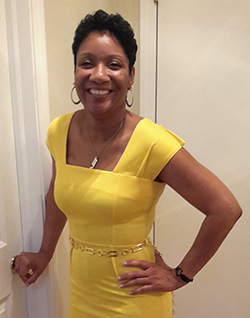Colon Cancer Survivor
The Power of Knowing
 Had Wenora Farrell known her grandfather died from colorectal cancer at age 38, she wouldn’t have delayed sending in her fecal swab test after her annual physical. She also would have pursued genetic testing. Both of those things might have prevented a Stage IIIB colon cancer diagnosis. Today, Wenora is healthy and a strong advocate helping people take better care of themselves in the fight against colorectal cancer.
Had Wenora Farrell known her grandfather died from colorectal cancer at age 38, she wouldn’t have delayed sending in her fecal swab test after her annual physical. She also would have pursued genetic testing. Both of those things might have prevented a Stage IIIB colon cancer diagnosis. Today, Wenora is healthy and a strong advocate helping people take better care of themselves in the fight against colorectal cancer.
Close to the end of my military career, I had an annual physical. Because I was 45, the doctor sent me home with a routine fecal test. He encouraged me not to throw it away, like so many people do. I reluctantly agreed to do it, but I didn’t hurry because I was busy pursuing my Masters. I sent it in after a couple of weeks and was surprised to get a phone call telling me traces of blood were found in the sample. Even though I wasn’t having any other issues, he referred me to a specialist to have an early colonoscopy. The doctor had a hard time doing the procedure because of a small blockage. We scheduled minor surgery for her to remove it but, when I woke up, I learned it wasn’t so minor after all. The blockage was a mass. The doctor removed it, and it left me with a six-inch incision and a Stage III colorectal cancer diagnosis.
My husband had recently passed away from pancreatic cancer, so I wasn’t shocked to hear I had cancer. I was, however, totally blindsided when the doctor said I’d likely had it for about 15 years. I didn’t have any obvious symptoms. Looking back, I didn’t have regular bathroom habits, and that could have been because of the blockage.
Not wanting to sit back and die, I began to educate myself. I discovered Fight Colorectal Cancer, an advocacy group dedicated to offering support for people facing colorectal cancer. A big component is making people aware of the genetic links to colorectal cancer. After my diagnosis, I found out that my grandfather had died from colorectal cancer at 38. More recently, my brother was diagnosed with Stage IIIC colorectal cancer. If we had known we were genetically predisposed to it, we could have had screenings earlier.
After recuperating from the surgery, I began chemotherapy. I would get an eight-hour infusion every two weeks, then go home with a box attached to me that dripped in more chemo for the next 48 hours. I lost my hair, felt sick to my stomach and had neuropathy. I felt unattractive, not like myself at all, and I didn’t want to be depressed. I had family and friends who inspired and encouraged me, and I told myself this wouldn’t last forever. The chemotherapy was successful, and I was declared cancer-free for five years.
After a regular six-month checkup, my oncologist suspected Lynch syndrome and wanted to do genetic testing. I wasn’t sure what the point was of doing it after already having successfully treated colorectal cancer, and she explained that I might need additional treatment and identifying any biomarkers would be helpful. Insurance paid for the test (it’s expensive, so it’s smart to talk with your insurance company before scheduling it) and it was confirmed I had Lynch syndrome. I also found out from the report that I had a 60 percent chance of getting endometrial cancer.
Because of the genetic report, my gynecologist recommended a total hysterectomy. After surgery, a biopsy was done on my uterus that was removed. It was discovered that I had early Stage I endometrial cancer with a grade 3 tumor. My first thoughts were, “How can I treat it, and are there any clinical trials available for me?” I realized I would seriously consider any means necessary to help me live. Fortunately, I didn’t need any chemotherapy treatment. Six-month checkups with my gynecologist and annual colonoscopies would be enough treatment for now.
This experience opened up a whole new chapter in my life. My research led me to take on an active research/advocacy role with Fight Colorectal Cancer. I became a “RATS” (Research Advocacy Training and Support) member. This means I am advocating for the advancement of research, which is crucial to finding new and better treatments for cancer patients. It has been an eye-opening experience as I journey for a cure and better treatment plan to fight colorectal cancer. I’ve also had opportunities to talk with Congressional members, participate in various scientific conferences on cancer and be selected as a Peer Reviewer on boards to assist with grants for cancer research. As a patient advocate, I feel blessed to be able to tell my story and give my input on behalf of other survivors. Sharing this information with the right audiences is so vital.
I’m a strong proponent of testing to learn your biomarkers. The average person doesn’t know what to ask doctors when it comes to cancer treatment. Knowing your biomarkers can help your doctors identify your best treatment options and help you make well-informed decisions about how your cancer will be treated. Knowing your biomarkers will allow you to be your own best advocate.
I have two daughters who have not had genetic testing done yet, but I encourage them all the time to do so. Not surprising, it’s somehow easier to convince total strangers to get regular colonoscopies than your family. However, what you hope for is that one listening ear whose life just might be saved by getting tested.


